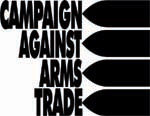Difference between revisions of "Campaign Against Arms Trade"
m (website) |
(unstub) |
||
| Line 3: | Line 3: | ||
|spartacus= | |spartacus= | ||
|constitutes= | |constitutes= | ||
| − | |interests=Arms Trade | + | |logo=CAAT Logo.jpg |
| + | |titular_logo=1 | ||
| + | |interests=Arms Trade,BAE Systems | ||
|start=1974 | |start=1974 | ||
|website=https://caat.org.uk/ | |website=https://caat.org.uk/ | ||
|headquarters=London, United Kingdom | |headquarters=London, United Kingdom | ||
| + | |description=[[UK]]-based campaigning organisation working towards the abolition of the international [[arms industry|arms trade]]. Was infiltrated by corporate spies. | ||
}} | }} | ||
| − | The '''Campaign Against Arms Trade''' (CAAT) was infiltrated by [[Adrian Franks]] | + | The '''Campaign Against Arms Trade''' ('''CAAT''') is a [[United Kingdom|UK]]-based campaigning organisation working towards the abolition of the international [[arms industry|arms trade]]. It was founded in 1974 by a coalition of peace groups. It has been involved in several high-profile campaigns, including a legal challenge against the [[Serious Fraud Office (United Kingdom)|Serious Fraud Office]]'s decision to suspend a corruption investigation into [[BAE Systems]] in 2007. |
| + | |||
| + | ==Research== | ||
| + | Campaigns are founded on research into the arms trade and arms companies, and their relationship with the UK government and [[UK/Military|military]], through political, financial and military support. The focus is on arms exports, although they recognise that there is a close relationship with [[military procurement]]. The research places particular emphasis on debunking myths and exposing hidden features of the arms trade, and large government subsidies given to the [[arms industry]], largely through government research and development but also through export credits, government promotion and military attaches. The website contains information about the arms trade, arms companies and campaigning material.<ref name=trade>https://caat.org.uk/challenges/the-arms-trade/</ref> | ||
| + | |||
| + | According to the campaign, "Governments like to give the impression that it is the [[illegal arms trade|illegal trade]] that is damaging, while the legal trade is tightly controlled and acceptable. In fact, the vast majority of arms sales to human rights-abusing regimes and into conflict areas are not only legal, but actively supported by governments. Many of these 'legal' sales violate the selling countries’ own [[arms export laws]]. It is true that there is also a large illegal arms trade, with arms smuggled across borders, stolen, or sold from military or police stocks without government authorisation. While also causing severe harm, it is much smaller than the legal trade."<ref name=trade/> | ||
| + | |||
| + | ==Infiltrated by spies== | ||
| + | Between 1995 and (at least) 1997, the Campaign was infiltrated by [[Adrian Franks]], [[Martin Hogbin]] and other agents from [[Threat Response International]] or [[BAE Systems]]. In September [[2003]] the ''[[Sunday Times]]'' published an article BAE had paid a company directed by [[Evelyn LeChene]] to infiltrate CAAT and collect information about its workings and activities. The [[journalists]] said that LeChene had used at least half a dozen agents posing as campaigners to provide detailed reports of work in the CAAT office, meetings and preparations for protests as well as copies of correspondence and other internal documents.<ref>https://caat.org.uk/about-caat/spying/</ref> | ||
| + | |||
| + | |||
{{SMWDocs}} | {{SMWDocs}} | ||
==References== | ==References== | ||
{{reflist}} | {{reflist}} | ||
| − | |||
Latest revision as of 07:08, 8 July 2023
 | |
| Formation | 1974 |
| Headquarters | London, United Kingdom |
| Interests | Arms Trade, BAE Systems |
| UK-based campaigning organisation working towards the abolition of the international arms trade. Was infiltrated by corporate spies. | |
The Campaign Against Arms Trade (CAAT) is a UK-based campaigning organisation working towards the abolition of the international arms trade. It was founded in 1974 by a coalition of peace groups. It has been involved in several high-profile campaigns, including a legal challenge against the Serious Fraud Office's decision to suspend a corruption investigation into BAE Systems in 2007.
Research
Campaigns are founded on research into the arms trade and arms companies, and their relationship with the UK government and military, through political, financial and military support. The focus is on arms exports, although they recognise that there is a close relationship with military procurement. The research places particular emphasis on debunking myths and exposing hidden features of the arms trade, and large government subsidies given to the arms industry, largely through government research and development but also through export credits, government promotion and military attaches. The website contains information about the arms trade, arms companies and campaigning material.[1]
According to the campaign, "Governments like to give the impression that it is the illegal trade that is damaging, while the legal trade is tightly controlled and acceptable. In fact, the vast majority of arms sales to human rights-abusing regimes and into conflict areas are not only legal, but actively supported by governments. Many of these 'legal' sales violate the selling countries’ own arms export laws. It is true that there is also a large illegal arms trade, with arms smuggled across borders, stolen, or sold from military or police stocks without government authorisation. While also causing severe harm, it is much smaller than the legal trade."[1]
Infiltrated by spies
Between 1995 and (at least) 1997, the Campaign was infiltrated by Adrian Franks, Martin Hogbin and other agents from Threat Response International or BAE Systems. In September 2003 the Sunday Times published an article BAE had paid a company directed by Evelyn LeChene to infiltrate CAAT and collect information about its workings and activities. The journalists said that LeChene had used at least half a dozen agents posing as campaigners to provide detailed reports of work in the CAAT office, meetings and preparations for protests as well as copies of correspondence and other internal documents.[2]